SPEA V160 Final Exam Review PDF
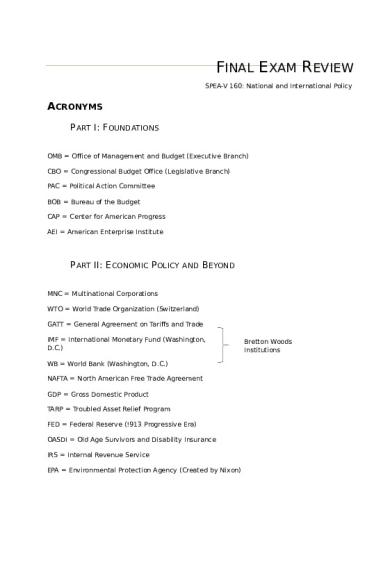
| Title | SPEA V160 Final Exam Review |
|---|---|
| Author | Malvika Sridhar |
| Course | Intro to National and International Policy |
| Institution | Indiana University Bloomington |
| Pages | 16 |
| File Size | 131.3 KB |
| File Type | |
| Total Downloads | 16 |
| Total Views | 129 |
Summary
Karaagac SPEA V 160 review...
Description
FINAL EXAM REVIEW SPEA-V 160: National and International Policy
ACRONYMS PART I: FOUNDATIONS OMB = Office of Management and Budget (Executive Branch) CBO = Congressional Budget Office (Legislative Branch) PAC = Political Action Committee BOB = Bureau of the Budget CAP = Center for American Progress AEI = American Enterprise Institute
PART II: ECONOMIC P OLICY
AND
BEYOND
MNC = Multinational Corporations WTO = World Trade Organization (Switzerland) GATT = General Agreement on Tariffs and Trade IMF = International Monetary Fund (Washington, D.C.) WB = World Bank (Washington, D.C.) NAFTA = North American Free Trade Agreement GDP = Gross Domestic Product TARP = Troubled Asset Relief Program FED = Federal Reserve (!913 Progressive Era) OASDI = Old Age Survivors and Disability Insurance IRS = Internal Revenue Service EPA = Environmental Protection Agency (Created by Nixon)
Bretton Woods Institutions
1 DOE = Department of Energy (Created by Carter) FICA = Federal Insurance Contributions Act VAT = Value Added Tax COLA = Cost of Living Adjustment CPI = Consumer Price Index SS = Social Security SSI = Social Security Income EITC = Earned Income Tax Credit SNAP = Supplemental Nutrition Assistance Program (Food Stamps) TANF = Temporary Assistance for Needy Families AFDC = Aid to Families with Dependent Children
TANF replaced AFDC
PART III: THE GENERAL WELFARE NEA = National Education Association AFT = American Federation of Teachers DOE = Department of Education (Created by President Carter) SAT = Scholastic Assessment Test ESEA = Elementary and Secondary Education Act NSF = National Science Foundation OECD = Organization for Economic Cooperation and Development HMO = Health Maintenance Organization PPS = Prospective Payment System DRG = Diagnostic Related Group NAACP = National Association for the Advancement of Colored People EEOC = Equal Employment Opportunity Commission FBI = Federal Bureau of Investigation CIA = Central Intelligence Agency
2 ATF = (Bureau of) Alcohol, Tobacco and Firearms DOJ = Department of Justice DOD = Department of Defense DOS = Department of State ACLU = American Civil Liberties Union ICE = Immigration and Customs Enforcement DEA = Drug Enforcement Agency
PART IV: THE COMMON DEFENSE NATO = North Atlantic Treaty Organization (Brussels) FOB = Forward Operating Base NSC = National Security Council NSA = National Security Agency JCS = Joint Chiefs of Staff IAEA = International Atomic Energy Agency SALT = Strategic Arms Limitations Talks (Under President Nixon and National Security Advisor Kissinger) START = Strategic Arms Reduction Talks (Reagan, H. W. Bush) DNI – Director of National Intelligence DHS = Department of Homeland Security SDI = Strategic Defense Initiative (Reagan) WMD = Weapon(s) of Mass Destruction
PEOPLE
3
NEED-TO-KNOWS Paul Ryan = Speaker of the House McCarthy = House Majority Pelosi = House Minority McConnell = Senate Majority Schumer = Senate Minority Mnuchin = Secretary of Treasury OMB Director = Mulvaney FED Heads = Greenspan, Bernanke, Yellen Paulson; Geithner = Obama’s Treasury Secretaries, respectively Jeff Sessions = Attorney General Holder = Obama’s first Attorney General Lynch = Obama’s second Attorney General
PART I: FOUNDATIONS Citrin = Author of Political Culture Polsby = Author of The Political System Mike Mansfield = Johnson’s Senatorial successor Newt Gingrich = Speaker of the House (starting in 1994) Louis D. Brandeis = Supreme Court Justice who coined the term, “laboratories of democracy” Lyndon B. Johnson = launched the Great Society in 1964 John Roberts = Current Chief Justice of the Supreme Court William H. Rehnquist = Chief Justice of the Supreme Court Warren Burger = Chief Justice of the Supreme Court Earl Warren = Chief Justice of the Supreme Court
4
James Madison = 4th President of the United States Alexander Hamilton = First Secretary of Treasury
Authors of the Federalist Papers
John Jay = First Supreme Court Justice Derthick = Author of Federalism Eisenhower = Interstate Highway System Kettl = Author of The Bureaucracy Charles Guiteau = Assassinated President James Garfield (angry about not receiving a federal job)
PART II: ECONOMIC P OLICY Adam Smith = Wealth of Hayek = Chicago School
AND
BEYOND
Nations Classical Theory
John Keynes = Keynesian Economics, Paradox of Thrift Rachel Carson = Silent Spring Orin Hatch = Proposed Balanced Budget Amendment John McCain = Cosponsor of The Comprehensive Immigration Reform Act of 2007 Edward Kennedy = Cosponsor of The Comprehensive Immigration Reform Act of 2007 Scott Pruitt = Secretary of the EPA FDR = New Deal
PART III: THE GENERAL WELFARE Waite and Howe = Authors of The Family Peterson = Author of Education Horace Mann = First Secretary to the State Board of Education in Massachusetts John Dewey =Opened the Laboratory School at UChicago in 1895
5 John Stuart Mill = Proposed school vouchers as a solution to the monopoly control of public education (excellence movement) Milton Friedman = Nobel Prize Winning UChicago economist Cutler and Keenan = Authors of Health Care Roy Wilkins = Executive Director of the NAACP Thurgood Marshall = Chief Council for the NAACP and later a Supreme Court Justice Patterson = Author of Black Americans J. Edgar Hoover = FBI Headquarters named after him
PART IV: THE COMMON DEFENSE Cohen = Author of The Military Merkel = Chancellor of Germany Macron = President of France Erdoğan = President of Turkey Xi Jinping = President of China Moon Jae-in = President of South Korea Quang = President of Vietnam Duterte = President of the Philippines Kim Jong Un = Supreme Leader of North Korea Powell = Former National Security Advisor to President Reagan, Chairman of the Joint Chiefs of Staff, Secretary of State under W. Bush General Dunford = Current Chairman to the Joint Chiefs of Staff Shinzo Abe = Prime Minister of Japan James Comey = former FBI director Christopher Wray = Current FBI Director
THINK TANK & MEDIA ORIENTATION
6
THINK TANKS CAP
Brookings
AEI
CATO
Heritage Foundation
MEDIA MSNBC
NBC
NYT
CNN
Wall Street Journal
FOX
IMPORTANT CONCEPTS PART I: FOUNDATIONS POLITICAL C ULTURE Sequence Model: Identification of Problem, Agenda=setting, Formulation of Policy, Legitimation, Implementation, Evaluation America is exceptional because it has the longest-living constitution
MODELS OF P OLITICS Non-Incrementalism/Rationalism: Policy as maximum social gain, cost-benefit analysis Incrementalism: Policy as variations of the past, building upon previous legislation Group Theory: Individuals are only important in politics when they act as a part of or on behalf of a group Elite Theory: Policy as elite preference
THE POLICYMAKING PROCESS
7 The Senate is like a carpool and the House is like a bus line Congressional staff have become careerists Bottom-Up Agenda Setting: Grass roots, starts with the people, public opinion and agenda setting, controlled by media reporting Top-Down Agenda Setting: Sign onto change that’s already happening, popular perceptions of policymaking Media decides what is newsworthy and therefore what is news
F EDERALISM Federalism: Constitutionally mandated, separate and autonomous authority Unitary: local governments can be altered/abolished by the federal government
Opposites
Liberals seek to enhance the power of the national government Conservatives seek to return power to state and local governments Rent Seeking: Lobbying government for special privileges, less in Washington than to go to all state/localities, concentrating benefits and dispersing the costs
THE BUREAUCRACY Bureaucracy: rule of office, competency and accountability Expanded with each major war despite the institution’s involvement Not a single entity Civil Service: replaced spoils system, part of Progressive reform movement, the way the nation staffs its government Three Goals: Competence, leadership, representativeness Congress controls the budget they operate under, as well as the size of their staffs
PART II: ECONOMIC P OLICY
AND
BEYOND
8
INTERNATIONAL TRADE Thesis: Trade reflects elite preference Hamiltonian: Protectionist, positive liberty Jeffersonian: No intervention, negative liberty Tariffs: tax on imported goods Quotas: foreign producers may only sell a specified number of goods in U.S., do NOT bring in revenue, foreign producers reap all benefits Global trade has raise aggregate income for the nation and increased inequality
ECONOMIC POLICY Fiscal Policy: decisions about taxing, spending, and deficit levels (Congress and the President) Monetary Policy: decisions about the money supply and interest rates (FED) Classical Theory: Market economy is a self-adjusting mechanism that will achieve an equilibrium of full employment, maximum productivity, and stable prices if left alone by the government 1776 Adam Smith Wealth of Nations Argues against mercantilism, which states that the government can improve the economy Favored elites and against middle class Makes political choices, not economic ones Best left alone Should benefit consumers Keynesian Theory: Economic instability is a product of fluctuations in demand, unemployment and lower wages reduced the demand for goods, only government could take necessary and countercyclical steps to expand demand by spending more money itself and lowering taxes Paradox of Thrift: an advanced economy won’t fix itself, it must be countercyclical. Government should spend like crazy when demand is down and reduce spending when demand is up Hayek and the Chicago School: revival of classicalism
9 TARP: Secretary Paulson bought preferred shares of stock from banks that held toxic assets 12 Federal Reserve Banks
TAX POLICY Personal income tax is the governments largest single source of revenue, Social Security tax is second Progressive tax: Marginal utility theory, assumption that high-income earners can afford to pay a larger percentage Regressive tax: larger percent from low income families, rich will put more money into job producing endeavors Proportional: flat tax Tax Reform Act of 1986: Reagan’s trade off – a reduction in tax rates in exchange for the exemption of many tax breaks – most heavily lobbied piece of legislation in U.S. History
IMMIGRATION P OLICY Elites: Multiculturalism Non-elites: assimilation Multiculturalism – Multiple cultural traditions (aboriginal ethnic groups and foreigner ethnic groups) within a single country Assimilation – The process by which a person or persons acquire the social and psychological characteristics of a group Segmented Assimilation – Assimilating into American political culture is a necessity, assimilating into American popular culture is not 18th century: extremely diverse, high degree of German immigrants, roman Catholics were more elite 1920 – 1960: Quota system, benefitted Northern Europeans and harmed Western/Southern Europeans and Asians, Bolshevism in Europe, thought socialism would come in with immigrants, progressives favored nativist restrictions and republicans were divided, very restrictive and nativist. Roman Catholics were poorer.
ENERGY AND THE ENVIRONMENT
10
Superfund laws of 1980 and 1986: EPA committed to cleaning up waste that is harmful to people The Love Canal in New York: landfill that served as the epicenter of a massive environmental pollution disaster that affected the health of hundreds of residents, culminating in an extensive Superfund cleanup operation. Rio Treaty: Weak, NGO’s Kyoto Protocol: 5 years after Rio Treaty, mandatory reduction to 1990 levels (40%), unattainable, Clinton administration signed but never sent it to Congress Rachel Carson: top-down environmentalist Three Mile Island: In 1979 at Three Mile Island nuclear power plant in USA a cooling malfunction caused part of the core to melt in the #2 reactor. The TMI-2 reactor was destroyed. Some radioactive gas was released a couple of days after the accident, but not enough to cause any dose above background levels to local residents. Chernobyl (Kiev, Ukraine) disaster: A combination of inherent reactor design flaws and the reactor operators arranging the core in a manner contrary to the checklist for the test, eventually resulted in uncontrolled reaction conditions. Water flashed into steam generating a destructive steam explosion and a subsequent open-air graphite fire. Accelerated the decline of the Soviet Union Fukushima: an energy accident at the Fukushima Daiichi Nuclear Power Plant in Ōkuma, Fukushima, initiated primarily by the tsunami following the Tōhoku earthquake on 11 March 2011.[6]Immediately after the earthquake, the active reactors automatically shut down their sustained fission reactions. However, the tsunami disabled the emergency generators that would have provided power to control and operate the pumps necessary to cool the reactors. The insufficient cooling led to three nuclear meltdowns, hydrogen-air explosions, and the release of radioactive material
WELFARE POLICY Middle class is major beneficiary Lyndon B. Johnson’s Great Society in 1960’s
11 Medicaid is preventative, Medicare is alleviative Medicaid: Federal and State Medicare: Federal Culture of Poverty: lack of self-discipline and present-mindedness leads to poverty as a way of life which is learned by society
PART III: THE GENERAL WELFARE EDUCATION I & II Nearly all of the nation’s problems are reflected in the demands placed on the nation’s schools and these demands are frequently conflicting Central Struggle: Parents want the instrumentals taught, teachers want to teach social well being SAT scores declines in the 1960’s and 1970’s even as per-pupil spending increased Education was traditionally a community responsibility, now a state responsibility 1862 Morrill Land Grant Act: grants of federal land to each state for establishing colleges in agriculture and mechanical arts Vouchers: Takes away federal spending, lower income families out of low income schools and into private ones UC v. Bakke: Race may be considered in college admissions, but may not be the determining factor, Burger Court Nation Builders: Elementary schooling becomes universal Progressives: Out of politicians’ hands and into professional educators’ Rights Reformers: American education is unequal because of discrimination Excellence Movement: Parental choice movement
HEALTH C ARE Bush expanded Medicare in ’65 to prescription drugs, payoff to voters over age 65; an increase in taxes was necessary but it didn’t happen; negative redistribution Health care is decentralized which is expensive
12 Concept of additional care; really a way for hospitals to avoid lawsuits
C IVIL RIGHTS I & II Brown v. Board: Warren Court, separate but equal is inherently unequal De Jure: Segregation by law De Facto: Segregation by society Civil Rights Act of 1964: Title VI said that federal departments must take action to end segregation in all programs receiving federal aid 1st Phase: Negative Liberty 2nd Phase: Positive Liberty
C RIMINAL J USTICE Rational Deterrence: criminals are rational and weigh costs and benefits Crime peaked in the 80’sa and have declined since Victimization is higher than official crime rate for complex reasons White collar crime is most expensive Crime is never victimless because of globalization Breakdown in the family structure causes individuals to lose social mores Crime is more frequent when deterrence is lax Miranda v. Arizona: Warren Court, 1960’s, Miranda rights Broken Windows: smaller crime will lead to larger crime, harsher punishment Federalization of Crime: Drug crime is the most federalized, congress had made more and more offenses federal crimes Racism in the law: Death penalty disproportionately given to black men
PART IV: THE COMMON DEFENSE
13
THE MILITARY CAT-4: lowest intelligence level allowed to serve in the military NATO: an attack on one of us is an attack on all of us Warsaw Pact: Military alliance of communist nations of Bulgaria, Czechoslovakia, East Germany, Hungary, Poland, Romania, and the Soviet Union.
Global reach has led to hubris, especially in the Bush administration Shanghai Communique: 1972, United States recognizes that Beijing will not invade Taipei, and Taipei will not declare independence Langley: CIA Foggy Bottom: Department of State
HOMELAND SECURITY Cold War: 1947 – 1989 MAD: mutually assured destruction Rogue Regime: has worked with terrorists Second Strike Capacity: a country's assured ability to respond to a nuclear attack with powerful nuclear retaliation against the attacker. Non-Proliferation (IAEA): the prevention of an increase or spread of something, especially the number of countries possessing nuclear weapons. NATO: Brussels Frankfurt: European Central Bank Powell Doctrine: U.S. Military should intervene only when necessary Desert Storm: the name used for the military operation in which international armed forces, including British and US troops, attacked Iraq in the Gulf War. It began on 16 January 1991 and lasted 100 days. Operation Iraqi Freedom: Operation where U.S. troops invaded Iraq and Saddam's forces collapsed almost immediately. Baghdad fell, and Saddam and other Iraqi leaders went into hiding. In the months that followed Saddam and many of his supporters were captured
14 Patriot Act: After September 11, congress passed a security legislation in order to make the country safer. The Patriot Act gives the authorities enhanced powers, such as looking up library records, to protect the country.
C OUNTRIES AND C APITALS * Afghanistan = Kabul Bosnia = Sarajevo * China = Beijing * North Korea = Pyongyang * South Korea = Seoul Laos = Vientiane Germany = Berlin France = Paris * Iraq = Baghdad * Iran = Tehran Japan = Tokyo Kuwait = Kuwait City Lebanon = Beirut Libya = Tripoli * Pakistan = Islamabad Palestine = East Jerusalem Somalia = Mogadishu Sudan = Khartoum * Syria = Damascus * Serbia = Belgrade * Turkey = Ankara * Taiwan = Taipei * Vietnam = Hanoi Yemen = Sana’a
C URRENCY Ruble: Russia Yuan: China Euro: Germany
15 Rupi: India Britain: Pound Won: South Korea Yen: Japan...
Similar Free PDFs

SPEA V160 Final Exam Review
- 16 Pages

SPEA-V 185 Final Exam Study Guide
- 33 Pages

Chem Final Exam Review
- 12 Pages

Final Exam - Review notes
- 92 Pages

Bio Final Exam Review
- 2 Pages
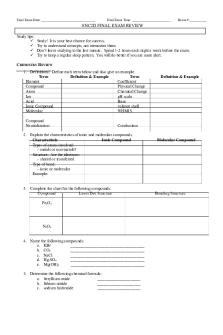
Final EXAM Review booklet
- 5 Pages
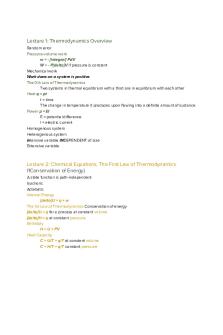
CHEM303 final exam review
- 4 Pages
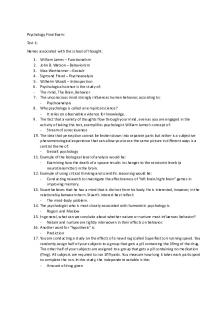
Psychology Final Exam - Review
- 13 Pages
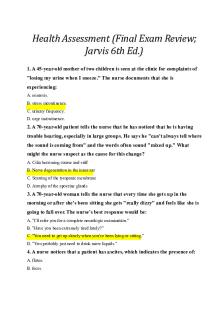
Jarvis Final Exam Review
- 12 Pages
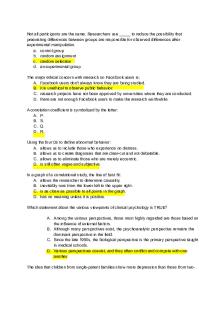
Final exam review
- 96 Pages
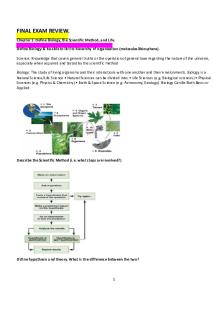
Final Exam Review
- 48 Pages
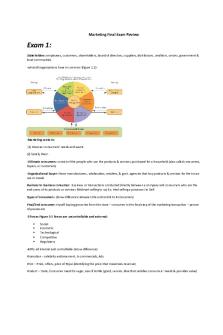
Marketing Final Exam Review
- 15 Pages
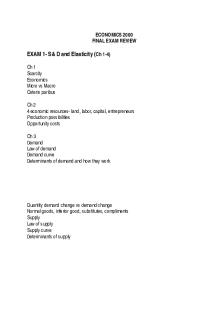
Final exam review
- 8 Pages
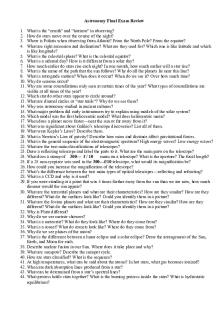
Astronomy Final Exam Review
- 2 Pages
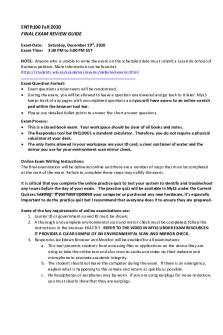
Final Exam Review Guide
- 4 Pages

Final exam review flsp4420
- 5 Pages
Popular Institutions
- Tinajero National High School - Annex
- Politeknik Caltex Riau
- Yokohama City University
- SGT University
- University of Al-Qadisiyah
- Divine Word College of Vigan
- Techniek College Rotterdam
- Universidade de Santiago
- Universiti Teknologi MARA Cawangan Johor Kampus Pasir Gudang
- Poltekkes Kemenkes Yogyakarta
- Baguio City National High School
- Colegio san marcos
- preparatoria uno
- Centro de Bachillerato Tecnológico Industrial y de Servicios No. 107
- Dalian Maritime University
- Quang Trung Secondary School
- Colegio Tecnológico en Informática
- Corporación Regional de Educación Superior
- Grupo CEDVA
- Dar Al Uloom University
- Centro de Estudios Preuniversitarios de la Universidad Nacional de Ingeniería
- 上智大学
- Aakash International School, Nuna Majara
- San Felipe Neri Catholic School
- Kang Chiao International School - New Taipei City
- Misamis Occidental National High School
- Institución Educativa Escuela Normal Juan Ladrilleros
- Kolehiyo ng Pantukan
- Batanes State College
- Instituto Continental
- Sekolah Menengah Kejuruan Kesehatan Kaltara (Tarakan)
- Colegio de La Inmaculada Concepcion - Cebu